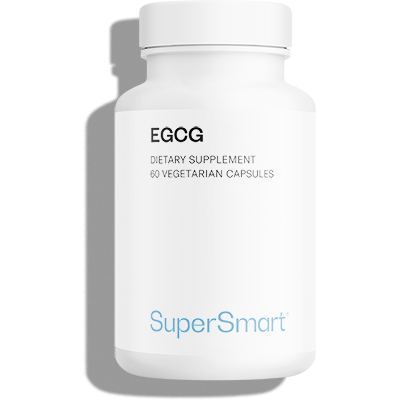06-03-2019
Menopause: the benefits of green tea catechins
 Popular for its flavour, green tea has also been recommended for centuries as a natural remedy. Known for its antioxidant activity and cardioprotective effects, it seems this refreshing beverage may provide natural benefits to women after the menopause. At least that was the conclusion of research published in the prestigious American Journal of Clinical Nutrition¹. Let’s take a look at the promising results revealed by this wide-ranging study.
Popular for its flavour, green tea has also been recommended for centuries as a natural remedy. Known for its antioxidant activity and cardioprotective effects, it seems this refreshing beverage may provide natural benefits to women after the menopause. At least that was the conclusion of research published in the prestigious American Journal of Clinical Nutrition¹. Let’s take a look at the promising results revealed by this wide-ranging study.
Large-scale study of healthy post-menopausal women
Countless scientific studies have been published on green tea, many of which have suggested that drinking this type of tea improves cardiovascular disease risk factors. This positive effect may be related to the tea’s exceptional content in catechins. These are polyphenols known for their antioxidant potency, with epigallocatechin gallate (EGCg) among the most-recognised for fighting oxidative stress, free radical damage and cellular ageing. It was this natural antioxidant’s specific benefits for healthy post-menopausal women which an American research team set out to evaluate in their double-blind, placebo-controlled study. A total of 1075 women were randomly allocated to receive either a supplement based on a green tea extract standardised in catechins, or a placebo. The women were monitored for one year, and any changes in levels of several relevant molecules were recorded, with a particular focus on circulating lipid parameters such as total cholesterol, HDL-cholesterol and triglycerides. The research team wanted to verify whether green tea catechins have a positive effect on the lipid profile of post-menopausal women.
Efficacy of EGCg on the lipid profile of post-menopausal women
At the end of the research period, the scientists were able to compare blood parameters of a total of 936 post-menopausal women who completed the study. They found a significant difference between the lipid profiles of women supplemented with the green tea catechins and those given a placebo. Their analysis suggests that the antioxidants in green tea, including EGCg, produced a reduction of 2.1% in total cholesterol, with an even greater change observed in the green tea-supplemented women who had initially presented with high total cholesterol levels. The researchers also found that levels of ‘bad’ LDL-cholesterol had fallen by an average of 4.1% while those of ‘good’ HDL-cholesterol remained the same. They therefore concluded that the catechins in green tea, including EGCg, may help improve the lipid profile of post-menopausal women.
This is yet further evidence of green tea’s benefits against cardiovascular disease. While the catechins in green tea have been widely documented for their antioxidant potency and cardioprotective effect, this new study shows that these polyphenols may also improve the lipid profile. Supplementation with green tea catechins was found to produce excellent results in reducing levels of ‘bad’ cholesterol in post-menopausal women. Dietary supplements containing optimal doses of catechins are available offering the opportunity to benefit from green tea’s many virtues. One such supplement is the patented formulation Sunphenon®, which contains a green tea extract standardised to 95% EGCg.
> Source :
1. Hamed Samavat, April R Newman, Renwei Wang, Jian-Min Yuan, Anna H Wu, Mindy S Kurzer, Effects of green tea catechin extract on serum lipids in postmenopausal women: a randomized, placebo-controlled clinical trial, Am J Clin Nutr, November 2, 2016.
Order the nutrient mentioned in this article

Green tea EGCG supplement for fighting oxidative stress and excess fat, two factors in the ageing process
www.supersmart.comFurther reading
12-11-2013
The European Union has finally authorised a natural sleep aid: melatonin. If you ask me, those responsible for banning this natural substance for so many...
Read more10-06-2014
Cruciferous vegetables - broccoli, cabbage, cauliflower - all contain powerful phytonutrients capable of modifying oestrogen metabolism in both women and men, thus preventing certain hormone-dependent...
Read more16-08-2017
Melatonin is a natural hormone produced by the pineal gland. Melatonin supplements are effective at treating sleep disorders. In addition, melatonin is used to boost...
Read more© 1997-2026 Fondation pour le Libre Choix
All rights reserved
All rights reserved
Free
Thank you for visiting our site. Before you go
REGISTER WITHClub SuperSmart
And take advantage
of exclusive benefits:
of exclusive benefits:
- Free: our weekly science-based newsletter "Nutranews"
- Special offers for club members only

















